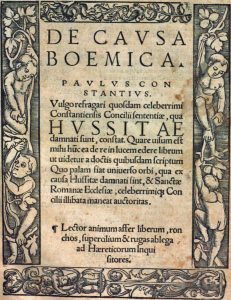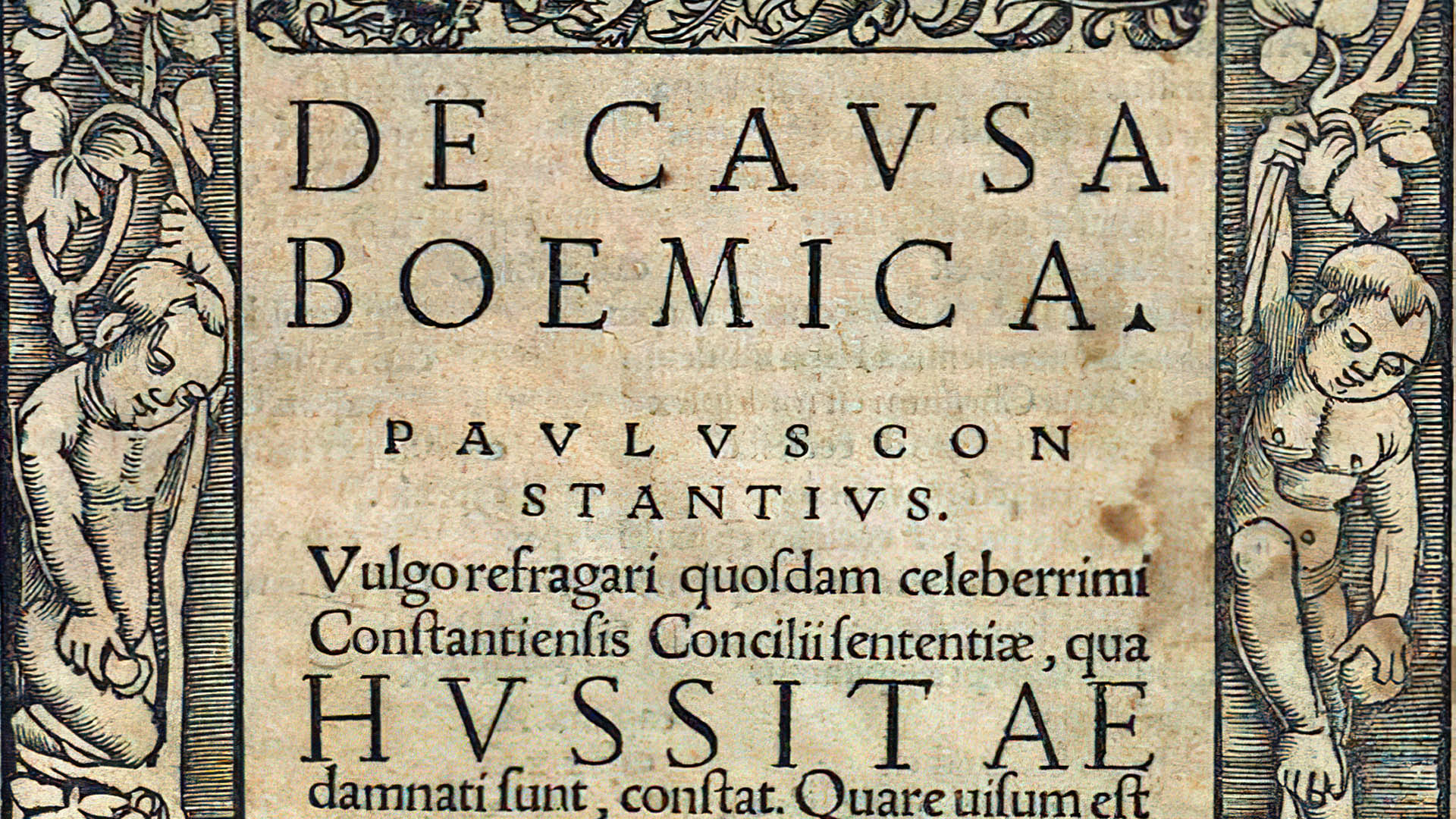
Title page of the first edition of De ecclesia , Haguenau 1520. Bavarian State Library, Munich.
Jan Hus’ most important work, written while he was in exile, was De Ecclesia, “The Church.” We are pleased to be able to provide a link to a PDF version of the 1915 translation into English by David S. Schaff, DD.
Download or read online:
1915 Translation of Hus’ De Ecclesia.
Courtesy of Archive.org.
From the German Wikipedia:
Jan Hus completed his main theological work, De ecclesia , written in Latin , in the South Bohemian castle of Kozí Hrádek in 1413. Under the protection of Bohemian nobles, he found refuge here when he had to leave Prague after the excommunication and interdict imposed on him .
The work consists of 23 chapters. In the first 10 chapters, Jan Hus systematically explains his understanding of the church. Chapters 11 to 23 are the answer to the indictment of the Prague theological faculty and a sharp rejection of the papal bull Unam sanctam . Hus particularly argues against the theses: “The subordinates are to obey the Roman Church and the rulers in all things” [2] , and “that it is necessary for salvation for every human creature to be subject to the Roman bishop” [3]. He describes the penal measures imposed on him – removal from office, interdict and excommunication – as illegitimate and contrary to church teaching and explains why he did not accept the summons to the papal curia in Rome on charges of heresy .
In his ecclesiology , Jan Hus closely follows John Wyclif, in some places he quotes verbatim passages from Wyclif’s tracts. Just like Wycliffe, he sees the church as a community of those chosen by God for salvation ( predestined ), who form the true body of Christ . But not all who outwardly belong to the Church also belong to the true Holy Church. Those who belong to the true body of Christ live according to the commandments of Christ and thereby demonstrate their love for God. However, anyone who violates the Scriptures does not belong to Christ and does not love God.
The head of the Church is Christ , not the Pope. Hus writes: “Christ is the head of the holy common church; she herself is his body, and each elect is his member and consequently part of the Church, which is Christ’s mystical – that is, mysterious – body”, and further: “Therefore the Pope is not the head and the cardinals are not the whole Body of the holy, universal and catholic Church, for Christ alone is the Head of this Church…”
Hus does not fundamentally reject the hierarchically structured church, but links the authority and powers of its ministers to a way of life based on the example of Christ. The Pope is only to be regarded as Christ’s and Peter ‘s successor and representative if he emulates Peter in his faith, humility and love, the cardinals are only true successors of the apostles if they live in their virtues. But when they set their minds on external wealth, splendor of clothing, and worldly rule, they are not followers of Christ and Peter, but governors of Judas Iscariot .
Hus does not recognize the primacy of the pope . The supremacy of the Bishop of Rome over all other bishops is, according to him, a consequence of the Donation of Constantine , that is, it goes back to a worldly decision and not to Christ. He writes: The “supremacy and appointment of the pope has emanated from the power of the emperor”.
Hus formulates a “Christian right of resistance” : believers have the right, even the duty, to check the orders of their superiors against the Holy Scriptures. Orders contrary to the law of Christ and harmful are not to be obeyed: “if such a thing were commanded by the Pope or by any other spiritual superior, the subject is not obliged to do it…” . On the contrary, the believer is to “resist them in the face when they walk contrary to the divine counsels and commandments.”
Read entire article in German (right-click/Translate To English to read in English)






 ”Vatican Council II affirmed that ‘every renewal of the Church is essentially grounded in an increase of fidelity to her own calling. Undoubtedly this is the basis
”Vatican Council II affirmed that ‘every renewal of the Church is essentially grounded in an increase of fidelity to her own calling. Undoubtedly this is the basis